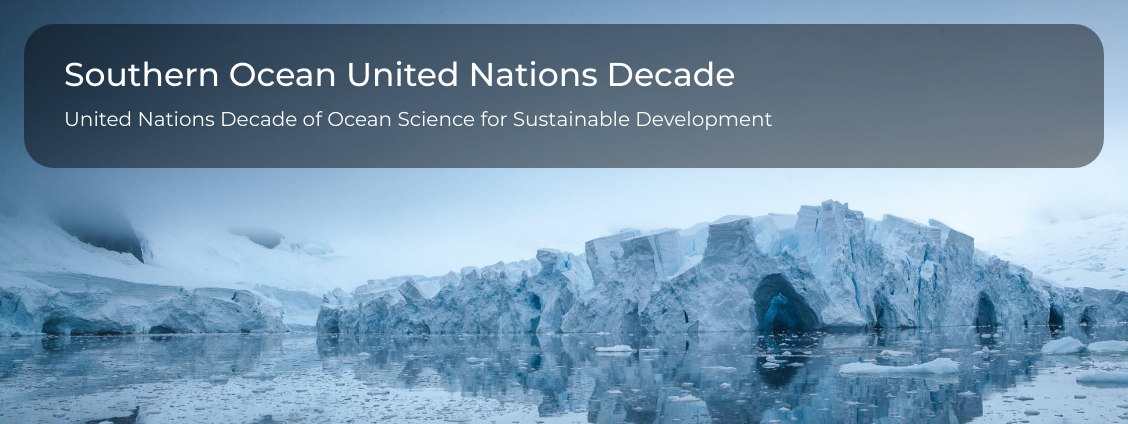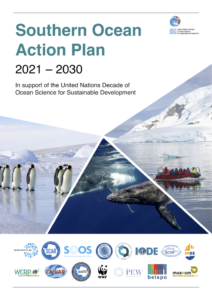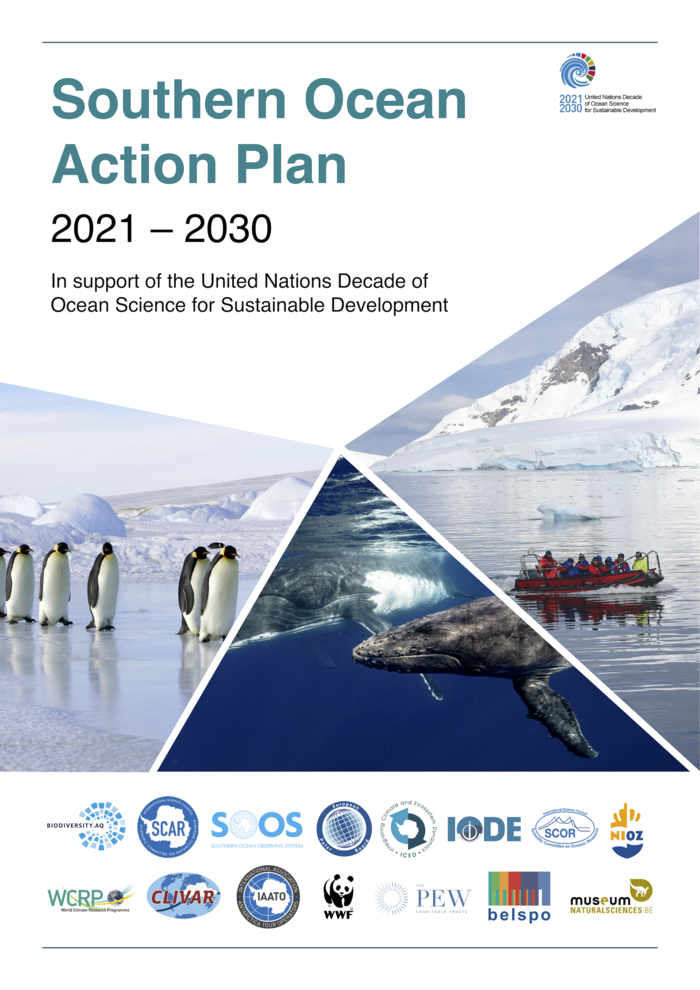In the Southern Ocean, human presence and the combined effects of various forms of pollution, transport, infrastructure, and the pursuit of living resources, together with accelerated climate change, are exerting increasing pressures on the environment. These changes have the potential to alter the role of the Southern Ocean in regulating global climate and other systems, which will in turn impact a host of other important ecosystem services. Being well adapted to stable environmental conditions, with unique traits, Antarctic species are considered more vulnerable to environmental perturbations and pollutants, compared to species from more northerly latitudes. The vast, remote and harsh environment of the polar regions means that no single nation can develop and implement a research and data strategy to understand and manage these regions.
The UN Ocean Decade and the Southern Ocean Community
In 2017, the United Nations proclaimed a Decade of Ocean Science for Sustainable Development (hereafter referred to as the UN Ocean Decade) from 2021 until 2030 to support efforts to reverse the cycle of decline in ocean health. To achieve this ambitious goal, this initiative aims to gather ocean stakeholders worldwide behind a common framework that will ensure ocean science can fully support countries in creating improved conditions for sustainable development of the world’s oceans. The initiative strives to strengthen the international cooperation needed to develop the scientific research and innovative technologies that can connect ocean science with the needs of society at the global scale.
The UN Ocean Decade Societal Outcomes align strongly with the remit of the Antarctic Treaty (see below). The Southern Ocean community, that involves not only the scientific research community but a much broader group with representatives of the business and industry sector as well as governance and management bodies, therefore recognises the need to develop and implement a coordinated, international plan that builds on our existing understanding of how human interaction with the Southern Ocean can benefit people and societies in ways that will also contribute to the protection and conservation of the unique characteristics of these regions.

Uplifting Southern Ocean Actions to Global Standards
The Southern Ocean is underrepresented at the international level, despite playing an important role in regulating climate and many other systems at the global scale. The Southern Ocean Task Force will benefit from the UN Ocean Decade in order to provide a platform to underline the importance of the Southern Ocean and highlight its relevance in the Earth System. Owing to its well-established operation, the Southern Ocean community is uniquely placed to join the United Nations Decade of Ocean Sciences for Sustainable Development.
Based on the recommendations in the Implementation Plan of the UN Ocean Decade, the Southern Ocean community engaged in a stakeholder-oriented process to develop the Southern Ocean Action Plan. As part of this global effort, the Southern Ocean Task Force identified the needs of the Southern Ocean community to address the challenges related to the unique environmental characteristics and governance structure of the Southern Ocean. Through this community-driven process, synergies within the Southern Ocean community and beyond were identified in order to elaborate an Action Plan that provides a framework for Southern Ocean stakeholders to formulate and develop tangible actions and deliverables that support the UN Ocean Decade vision.
The Southern Ocean Action Plan
With funding obtained via the Belgian Science Policy Office (BELSPO), the Royal Belgian Institute of Natural Sciences (RBINS) took on a leading role in coordinating the Southern Ocean Task Force and guiding the Southern Ocean process.
The Southern Ocean Decade and Polar Data Forum Week 2021, co-organised in September 2021 by RBINS and the European Polar Board, was one of many concrete initiatives. The week-long event gathered 400+ participants with diverse backgrounds, which allowed for cross-fertilisation of ideas between researchers, data managers, policymakers, business, industry representatives, etc. The discussions and collaborative work culminated in the publication of the Southern Ocean Action Plan, that was publicly launched during a webinar on April 12th, 2022.

The Action Plan describes the bridges we need to achieve the Southern Ocean we want, with respect to
- Funding: Securing sufficient and long-term funding, and coordination of the funding, is particularly crucial for the Southern Ocean, as many areas are inaccessible throughout the winter season. Therefore, there is a need to coordinate calls to improve the technological capabilities to operate in and observe inaccessible areas year-round, to transport, maintain and rapidly analyse samples, and to support the establishment of a sustained collaborative network of long-term observatories.
- Crossing boundaries: Transcending national efforts internationally, linking research disciplines, and co-designing global polar research priorities, are crucial for a long-term and integrative research strategy.
- Identifying and connecting stakeholders: Improving the dialogue at the science-policy interface, ensuring that societal needs are reflected and addressed through research, and linking the industry with research, infrastructure and logistics, will illustrate the potential of available knowledge and the uptake by stakeholders (including decision-making) and lead to better management practices and strengthened protection of the fragile Southern Ocean region.
- Data, observations and modelling: Informed decision making to achieve the ocean that we want relies upon appropriate scientific input, which itself relies upon scientific data. In order to make the best possible use of such data, we must improve spatial and temporal coverage, ensure that data are fully utilized, maintain data series and continually make these available to new generations of researchers, and make maximal use of modelling and new and novel techniques (such as Artificial Intelligence and Machine Learning Techniques).
- Capacity building, inclusion and diversity: The current capacity of the Southern Ocean community is not sufficient to address all of the issues that are now being faced, many of which have important societal implications. Therefore, there is a need to ensure diversity of voices at the table (at all stages of planning, research, funding and data sharing), to invest in capacity building, and improve technology for better access to data and information.
“Through the publication of the Southern Ocean Action Plan, the Southern Ocean Task Force aims to mobilise the Southern Ocean community and inspire all stakeholders to seek engagement and leverage opportunities to deliver innovative solutions that maintain and foster the unique conditions of the Southern Ocean” says Annemie Rose Janssen of the RBINS, and lead author of the Action Plan. “This framework provides an initial roadmap to strengthen links between science, industry and policy, as well as to encourage internationally collaborative activities in order to address existing gaps in our knowledge and data coverage.”
As such, and being part of the UN Ocean Decade, the Southern Ocean Action Plan aims to contribute to the achievement of the UN Agenda 2030 and its Sustainable Development Goals in a polar context. Only in this way can we achieve a clean, healthy & resilient, productive, predicted, safe, transparent & accessible, and inspiring & engaging Southern Ocean.

More information
To learn more about this decade-long initiative, please visit the project website and the Southern Ocean Action Plan, subscribe to our newsletter and follow us on Twitter and Vimeo.
We thank the Belgian Science Policy Office (BELSPO) for the financial support under BELSPO contract n°FR/36/ AN1/AntaBIS and BL/36/FWI34_PUNDOS-PPODS in the Framework of EU-Lifewatch.
The Antarctic Treaty was signed in 1959 by the 12 countries whose scientists had been active around Antarctica in 1957-58, including Belgium (there are 54 members nowadays). It entered into force in 1961 and describes, among other things, the intentions to only use Antarctica for peaceful purposes, to guarantee the freedom of scientific investigation in Antarctica, and to make scientific observations and results from Antarctica freely available.

